If you’re tired of getting lost in the vast sea of Google search results, Marcus-Aurelius has the legit, no B.S. answer. To rank on Google only involves a few steps, a small investment, and lots of time and effort. Here, we will walk you through the best AI tools and strategies that will help you rank the highest on Google in 2024. It’s with this very strategy that we got you to click on this article so if you’re interested, read on!
Step 1. Of Ranking on Google
To begin, you need to find a topic or search term that is not too competitive. To truly rank on Google, you cannot compete with large, high-budget corporations. At least not in the beginning… So the first tool we will recommend is the free Google Keyword Planner. Understanding the intent behind Google searches and their competitiveness is essential for effective content optimization. By utilizing Google search and tools such as Google Keyword Planner, analyzing SEO content becomes a search for data. These tools provide valuable insights to create a relevant keyword list for content optimization.
The Importance of Low-Comp Keyword Research
Keyword research forms the bedrock of effective SEO strategies, driving informed content creation and website optimization. Finding micro and macro keywords research is crucial for developing a rank-able article.
Pro tip: Use Chat GPT to find unique and potentially low-comp keywords. An example prompt for Chat GPT to find relevant keywords could be something like: “I am a writing an SEO optimized article about -insert industry/topic-. I need you to help me find a list of keyword ideas that potential people could be searching for on Google. Please provide me with a list of unique keyword ideas that directly relate to my topic of -blank- and have a commercial search intent. Please provide me with a list of keyword ideas.” – These are then the keywords you will input into the Google Keyword Planner later.
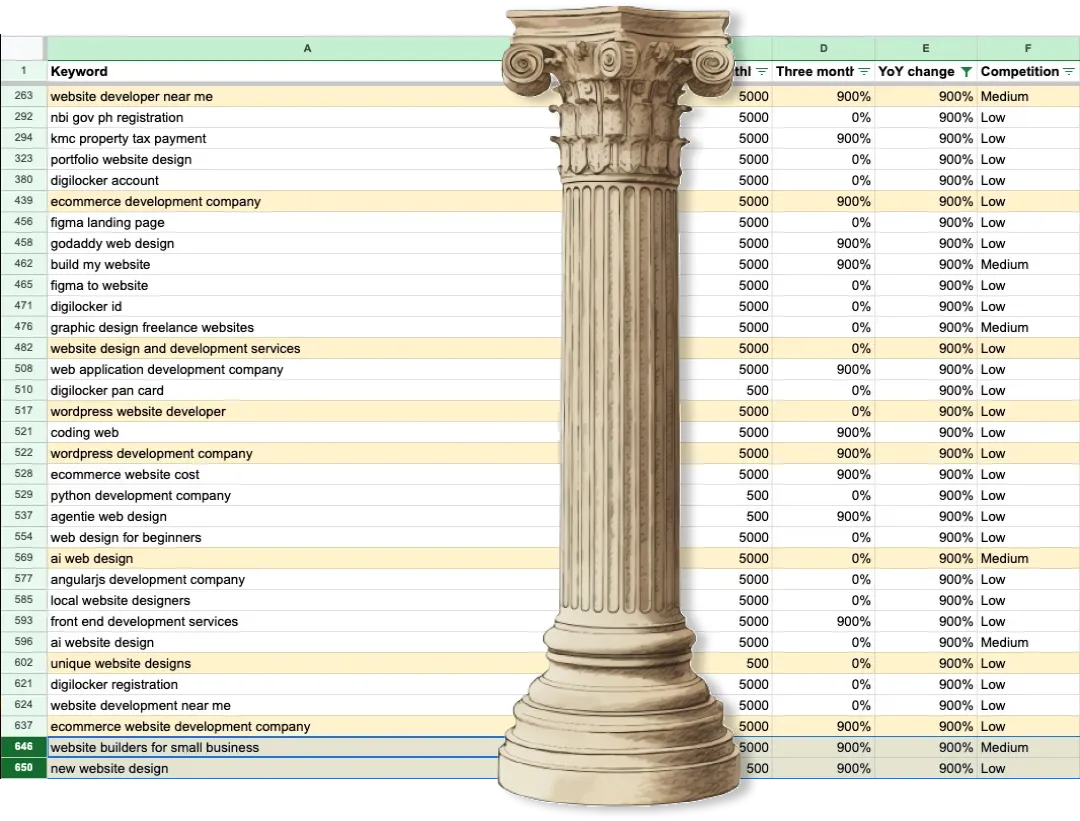
Step 2. Data is Key
Once you have an idea of what keywords you want to rank for, input them into the keyword planner. Understanding the competitiveness of keywords is essential for SEO success, you do not want to aim at ranking for a highly competitive keyphrase or word with a ridiculously high search volume as you would be competing with too many “big boys”.
Find the sweet-spot
Refining content strategies involves understanding the best keywords to rank for. As you can see above in the image, the keyword planner provides you with a series of metrics that will allow you to determine the best-fitting keyword to rank for. Ideally, you want to find medium or low-competitive keywords that have a 900% search increase (monthly, yearly or both) and are within the range of 3,000 in search volume. This will maximize your chances to gain traffic to your webpage.
Pro tip: Even keywords with a search volume of 500 or less are still very well worth trying to rank for.
Step 3. Go Deeper
Now that you have found a winning keyword or phrase related to your niche or topic, you could move on straight to step 4, but you could also go deeper… You might want to find more data in order to enhance the quality of your content. Incorporating related keywords elevates content relevance and enhances visibility in Google search – you may even increase your chances and rank for a related keyword too. Diverse search queries are addressed, optimizing content for organic search.
Tools to Find Related Keywords
AnswerThePublic is a great tool for keyword analysis and comes in handy here. It offers insights into related keywords for SEO content optimization and provides keyword suggestions and queries from search engines that will enhance your content relevance.
Once you have your primary keyword (the one you want to rank for), you can bring them into the next step.
Pro tip: Input the keywords you find from the Google Keyword Planner into Answerthepublic. This will provide you with even more keywords and phrases that will help densify the quality of your article. Plus, it will also provide you with future article ideas!
The tool will spit out a whole cluster of related, questions, statements, and just things that real people have been searching for on Google regarding the keyword you entered. All great content for you to use in your article!
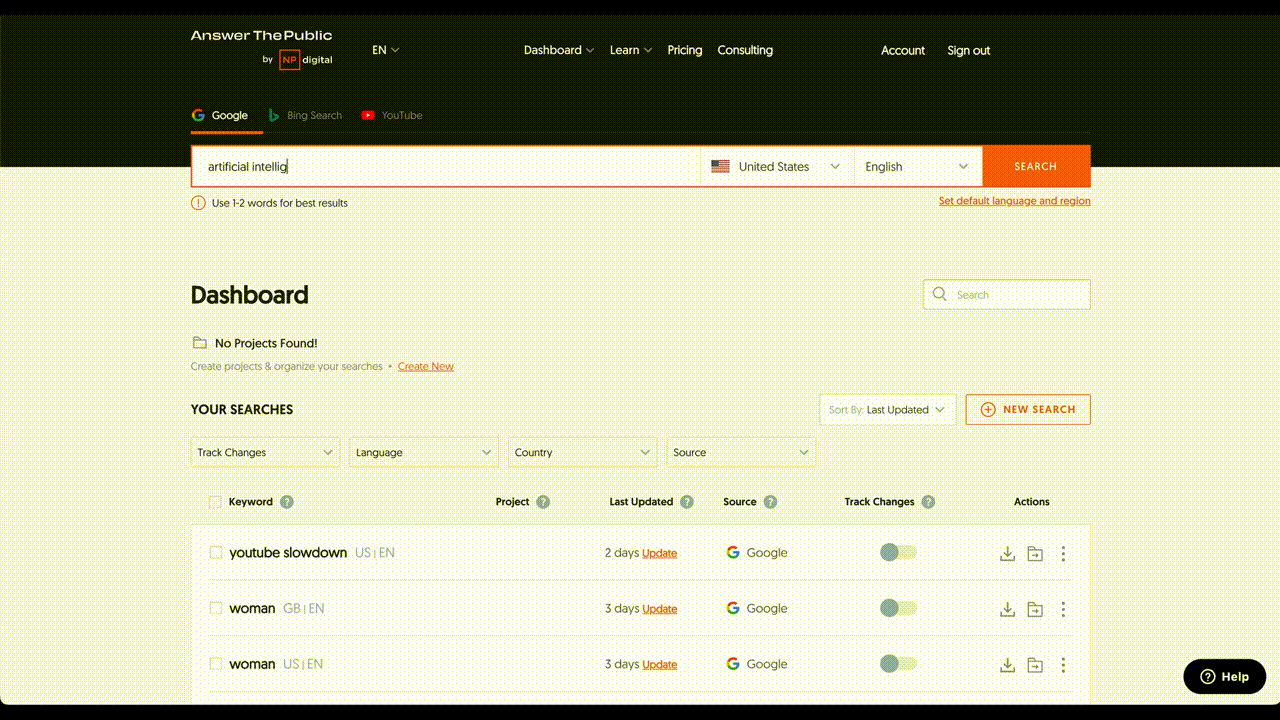
Step 4. Leverage Artificial Intelligence
The secret weapon to rank highly on Google is AI. AI-powered tools provide further keyword suggestions, surf the web for the competitors that are already ranking for your chosen keyword and, most importantly, practically write the thing for you…
The Benefits of AI in Keyword Research
These tools are truly invaluable for generating a keyword-rich, SEO-optimized article that is not only going to rank highly on Google but also better than your competitors. However, you have to know HOW to use them correctly.
AI Copywriting Tools
There are many AI tools and software you can use to help enhance and automate your article writing.
The most popular:
| Tool Name | Focus Area | Key Features | Pricing Plans |
|---|---|---|---|
| Jasper | Business Content | AI for generating business-related content | Up to $125/month |
| Copy.ai | Copywriting | Engages users for input | Up to $49/month |
| Anyword | Writing Aid | Provides engagement scores | Starter: $49/month |
| Sudowrite | Fiction Writing | Specialized AI for fiction | $19/month |
| Writer | Non-GPT Editing | Excels in style-guide adherence editing | $18/user/month |
| Writesonic | GPT-4 Writing | Offers GPT-3.5 and GPT-4 options | Up to $19/month |
| Rytr | Cost-Effective | Free and budget-friendly options | Up to $9/month |
| Chat GPT | Conversational AI | AI for information, assistance, and creative content | 20$/month |
While all of the above are great tools, they lack a very important aspect when it comes to writing an article that will truly rank on Google. And that is the ability to analyse, compare, and dynamically project SERP data within their interfaces. Which is why…
Our top pick is:
| Tool Name | Focus Area | Key Features | Pricing Plans |
|---|---|---|---|
| Scalenut | Researched Copywriting | Advanced AI for generating long form content utilising live SERP data. | Up to $984/year |
Step 6. Using Scalenut for Writing Your Articles
It’s essential to use AI as a collaborative tool; while it can provide a strong starting point, your expertise and creativity are crucial for refining and personalizing the content.
Lucky for you, Scalenut has a very easy-to-use step-by-step interface and provides you with all the customizations you need.
Use the Article Writer and begin by inserting your keywords into Scalenut. We recommend changing the country to the one your target audience is based.
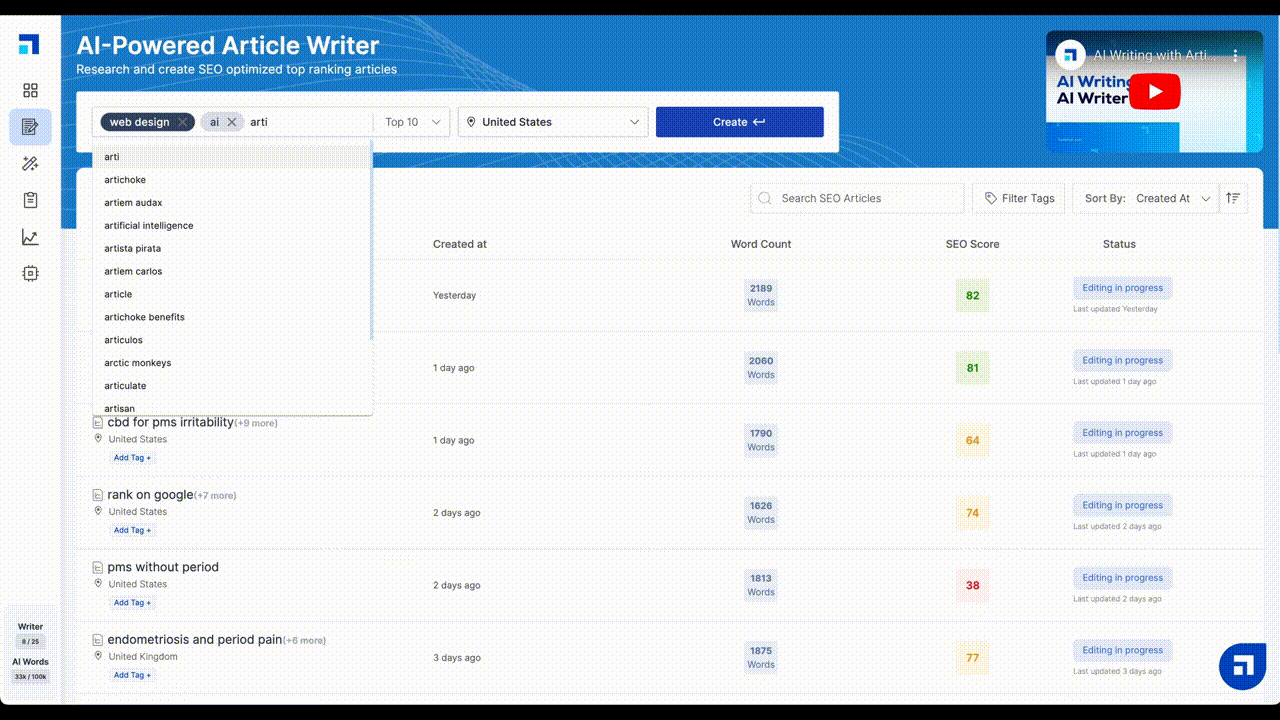
Provide a brief description of what you want Scalenut to include in the article. Try and be as precise as you can.
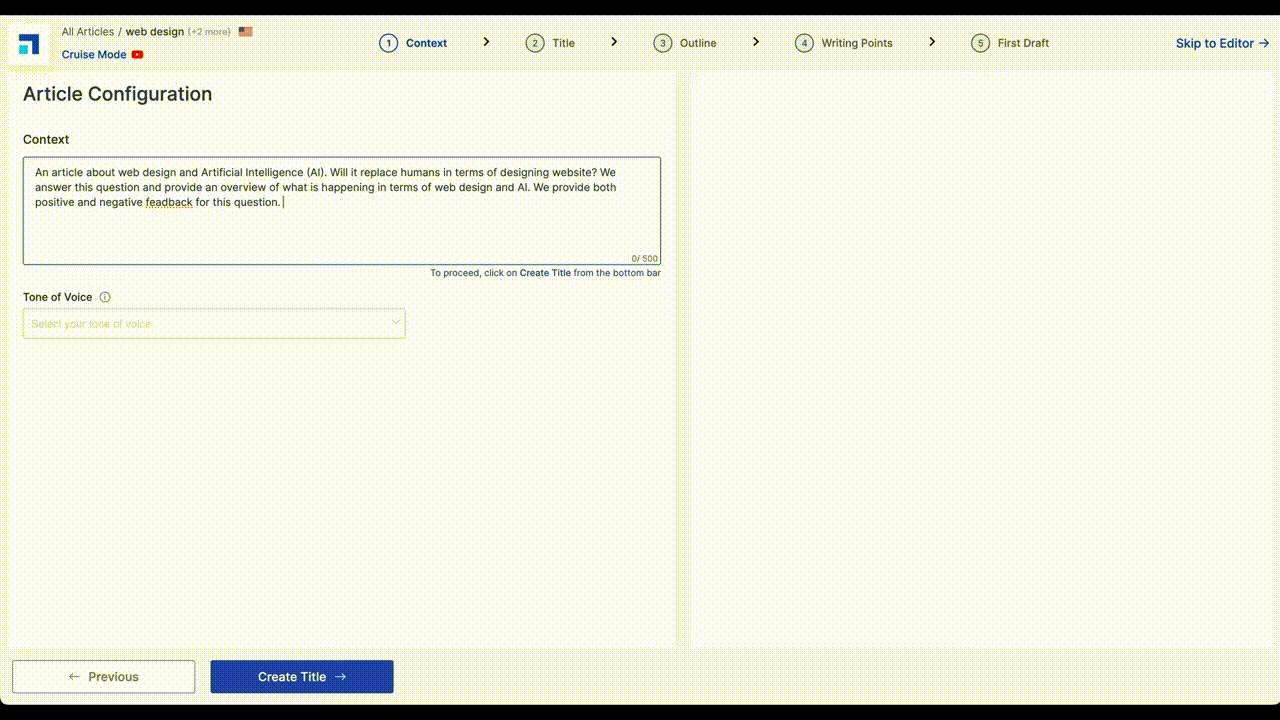
Now, you are prompted to add your title. This is one of the most important steps so take care. Scalenut will provide you with AI-generated ideas and also provide you with the option to rephrase already ranking titles from your competitors. Choose a title wisely, preferably one that includes your primary keyword and has the potential to grab attention.
Use words like Puzzling, Reveal, Expose, Insider, Confidential, Behind-the-Scenes, Unanticipated, Astonishing, Quest, Taboo, Forbidden, Off-Limits, Illicit, Unexplained, Inexplicable, Unresolved, Rare, Exclusive, One-of-a-Kin.
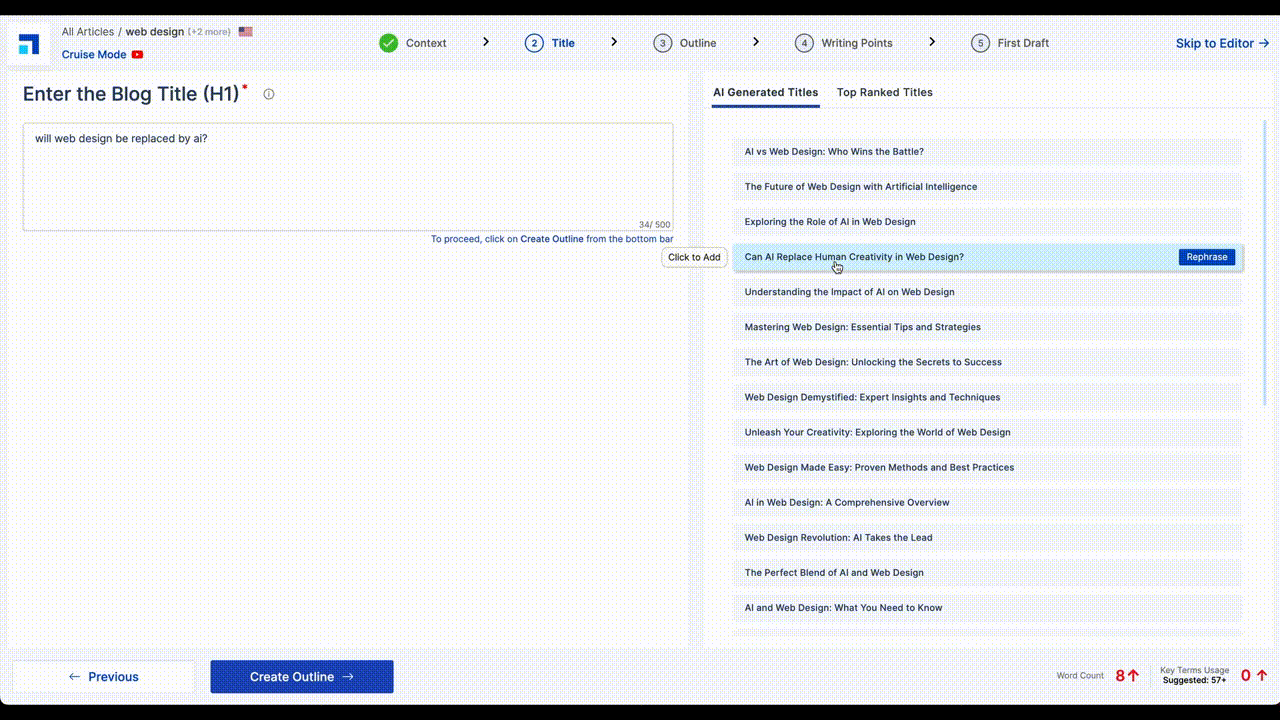
Scalenut will now generate your headings, subheadings and paragraphs. In this step, you can add or remove questions and headings accordingly.

Once you have followed all the steps provided by Scalenut and it has generated the whole structure and contents of your article, you will end up in the editor. This is where you will refine, humanize and optimize your article. Scalenut provides you with researched data, competitive SERP analysis that you can use to increase your SEO score. You also have the option to add stock images directly from their interface! It truly has it all!
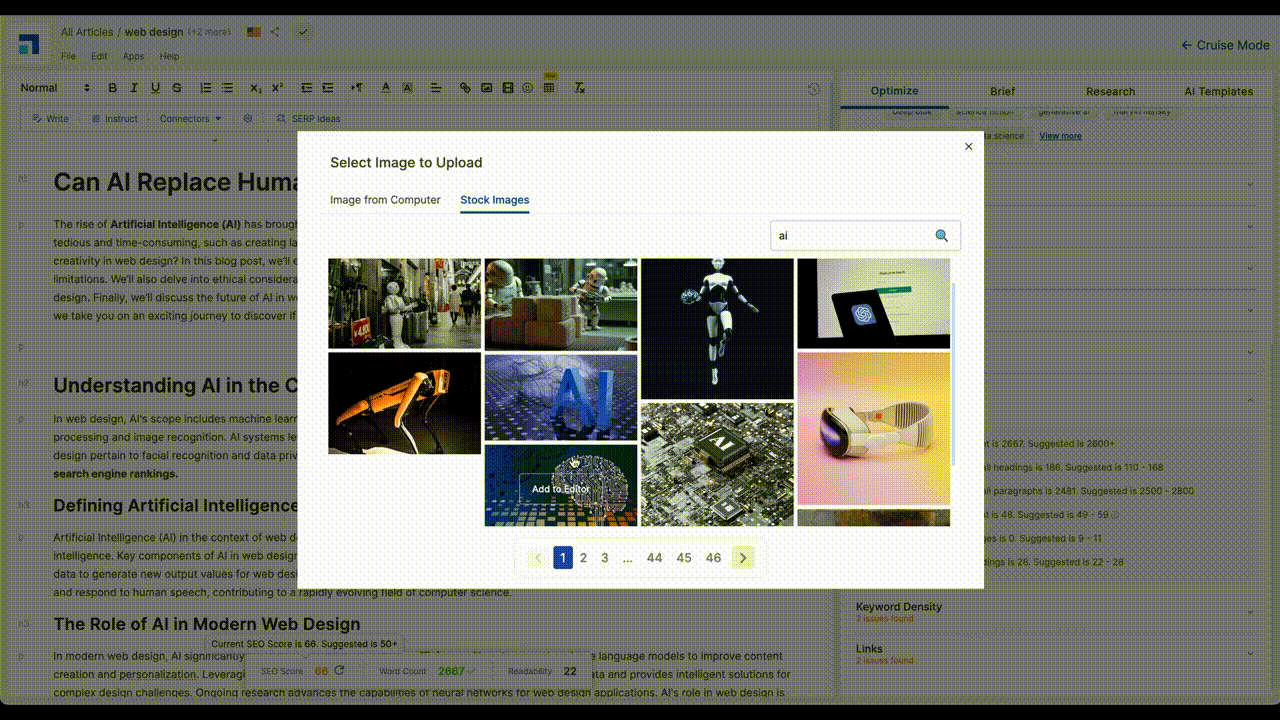
Try and achieve the highest SEO score possible by following the guides that are provided to you on the right-hand side of the editor under “optimize”. This will ensure a greater likelihood of ranking high up in the search results.

Step 5. Refine Your Article
Now that Scalenut AI has done the hardest part for you by providing you with the structure, content and competitive edge, it is up to you to add your expert and unique touch. Adding your unique points of view, knowledge, and expertise is one of the most important. Google rewards this the most and will never rank an article that is not informative and informative.
Crafting a user-centric article involves humanizing content to directly address customer queries. Enhance engagement by refining blog posts to offer valuable and consistent information, making them more useful. This approach ensures a better user experience and increases the likelihood of higher Google search rankings.
Making Your Content Useful for Readers
Understanding related keywords and offering relevant content enhances the search experience, making your blog more valuable to readers. By doing so, you can optimize your blog to be more useful and engaging for your audience. In other words, focus more on providing the reader with a useful piece of information rather than anything else.
Humanizing Your Blog Post for Better Engagement
Although Scalenut does an extremely good job, the AI can still go a little over the top and reproduce content that is either repetitive or simply just content that drags on. It is up to you to modify the repetitiveness and add a more fluid, human touch. Do not be afraid to delete the heading and whole paragraph to create a richer dynamic.
Humanizing content resonates with potential customers and personalizes their experience. Understanding search engine autocomplete suggestions is essential for better engagement. This approach enhances the user experience and boosts your SERP results.
Step 6. Repeat the Process
Now, the article you just took the time to write might not rank in the top 10 or even the top 20. But rest assured, it WILL RANK and bring you traffic. Or, if you found an extremely good keyword, it might rank on the first page, which is great!
But, in case it didn’t, you need to keep at it and create more optimized articles using this same strategy until you can start dominating your niche or industry. Once you get good at using these tools, you can generate a bunch of these highly optimized articles daily. Get a content calendar based on keyword ideas and be consistent.
How Often Should You Repeat This Process?
It is really up to you. How much time are you willing to spend writing SEO articles on a daily/weekly basis? Organic SEO is all about being consistent by producing quality content driven by data and research. So, if you follow this step-by-step guide, and you dedicate a certain amount of time in your schedule to do it, you will absolutely rank on the first page of Google.
Conclusion
In conclusion, to truly rank on Google in 2024 requires a comprehensive approach that includes effective keyword research, competitor analysis, and leveraging AI technology. It is essential to identify your target keyword and analyze its competitiveness to optimize your content for better visibility. Additionally, discovering related keywords can help enhance your SEO strategy. Most importantly, crafting a blog post that caters to SERP results and refining it for better user experience is a crucial step in achieving higher rankings. Lastly, repetition and consistency in implementing these strategies will contribute to long-term success. Stay proactive and adaptable to the evolving search landscape, and you’ll be well-positioned to rank on Google in 2024 and beyond.
Frequently Asked Questions
How do you get ranked on Google?
Google rankings are determined by relevance, authority, and user experience. Optimize your content with relevant keywords and quality backlinks to improve relevance. Create high-quality, shareable content to establish authority. Enhance user experience by improving website speed and mobile responsiveness.
How do I get my Google listing on top?
To get your Google listing on top, focus on creating high-quality and relevant content for your website. Incorporate targeted keywords in your content and meta descriptions. Optimize your website for mobile devices and improve its loading speed. Lastly, build backlinks from reputable websites in your industry.
How long do a website take to rank on Google?
The time it takes for a website to rank on Google can vary. It depends on factors such as keyword competitiveness, content quality, backlinks, and website structure. Some websites may see results in a few weeks, while others may take months or even years. Consistent SEO efforts can lead to better rankings over time.
How can I rank my webpage in Google?
To rank your webpage on Google, focus on creating high-quality and relevant content for your target audience. Optimize your website’s technical SEO, including page speed and mobile responsiveness. Build high-quality backlinks from reputable sources to increase your website’s authority. Stay up-to-date with Google’s algorithm updates and adjust your strategy accordingly.

